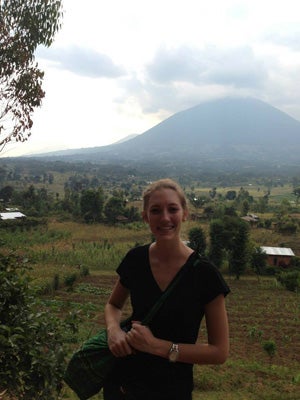Urban Studies graduate considers the great divide
 When Sarah Geisler was working at the U.S. Embassy in Kigali, Rwanda, she quickly learned that there are certain subjects you do not bring up with the people who live there, starting with the genocide.
When Sarah Geisler was working at the U.S. Embassy in Kigali, Rwanda, she quickly learned that there are certain subjects you do not bring up with the people who live there, starting with the genocide.
In 1994, Rwanda was torn apart by the mass slaughter of Tutsis, the minority ethnic class, by the Hutu majority ruling power. Two decades later, the country enjoys an uneasy peace: Mentioning “Hutu” or “Tutsi” is illegal, and people convicted of genocide-related crimes have been tried by their own villages and forced to live where the crimes occurred. A mandatory remembrance is held every April at a local stadium, where survivors must stand up and tell their stories.
Everyone over the age of 20 is a genocide survivor. Some bear machete scars on their faces and bodies.
“You can see it on the people, but as an outsider, you’re not supposed to talk about it,” says Geisler.
Though chilling, the country’s invisible divide was exactly what attracted her. Ever since her undergraduate days in the Urban Studies Program in the Kenneth P. Dietrich School of Arts and  Sciences, from which she earned her degree in 2012, Geisler has been fascinated by the notion of divided cities, a topic she continues to pursue as a graduate student in public diplomacy at the University of Southern California. It is an ironic focus, given that her childhood was spent cloistered on Pittsburgh’s North Side, with nary a thought of the neighborhoods beyond the river.
Sciences, from which she earned her degree in 2012, Geisler has been fascinated by the notion of divided cities, a topic she continues to pursue as a graduate student in public diplomacy at the University of Southern California. It is an ironic focus, given that her childhood was spent cloistered on Pittsburgh’s North Side, with nary a thought of the neighborhoods beyond the river.
“I never really crossed the rivers,” she explains. “I had everything that I needed over in my little area.”
When she started attending Pittsburgh’s High School for the Creative and Performing Arts downtown, her world began to slowly expand. She continues that process through the Thomas R. Pickering Foreign Affairs Fellowship, which will include three years as a foreign service officer with the U.S. State Department after she graduates. But her undergraduate years at Pitt helped her fall in love with her hometown, as well as the idea of the world beyond.
As a freshman, Geisler took the Introduction to Urban Studies class with Professor Carolyn Carson. Immediately, something clicked, and she was thrilled to be able to fuse her interest in city life with an array of cultural studies.
“I came in from high school thinking that maybe I would do international relations. But I have never been much of a theory person,” she says, and the idea of an international career intimidated her, particularly since she does not consider learning foreign languages to be one of her strong suits. “I had only ever been in Pittsburgh, so I was convinced that I could never do that.”
She credits the Urban Studies Program, and the faculty who mentored her, in helping her create a path of study that allowed her to discover her niche.
“I realized I could do it [an international career], I just needed to get there from a different place,” she says. In the summer of 2010, the Vira I. Heinz Scholarship for Women in Global Leadership allowed her to study in Cyprus.
Geisler arrived with little understanding of the island’s political situation. About a third of its territory has been occupied by Turkey since 1974, which the people of Cyprus dispute. A massive barrier of barbed wire patrolled by United Nations peacekeepers divides the capital city of Nicosia. People were only allowed to start crossing the barrier in 2004, and the occupied side appears stuck in 1974, including entire communities that became ghost towns.
When touring Nicosia close to the barrier, which is known as the Green Line, Geisler was struck by how a tour guide told the story of the invasion, then spit on the barrier.
“I was so shocked – and kind of offended – that this kind of thing was happening, and I had no idea about it,” she recalls.
For her senior thesis, she analyzed the literal and metaphorical barriers that divide people in Singapore, Beirut, and Istanbul. In her current studies, the theme of division has led her to examine how formerly divided communities – especially in post-conflict societies – can rebrand themselves to the rest of the world. In Rwanda, for example, there are success stories to be had alongside its tragic past; the nation has successfully lowered the HIV/AIDS infection rate from one of the highest in Africa to one of the lowest. But while the country continues to tamp down any potential for renewed conflict, its efforts at repatriation and remembrance remain somewhat difficult for outside eyes to understand.
After she graduates from USC in May, she will enter training for the Foreign Service. Geisler is unsure where she will wind up, but she is grateful to be assured of a job in a difficult market. Still, the possibility of danger lingers in the back of her mind. She was in Rwanda when the U.S. closed four African embassies – including hers – during a period of heightened security in response to an Al Qaeda threat.
“It’s obviously very exciting,” she says. “Of course, at the same time, it’s terrifying. I guess the best things in life are simultaneously exciting and terrifying.”
